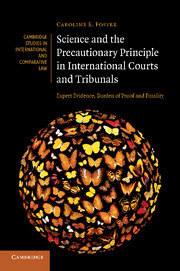 Science and the Precautionary Principle in International Courts and Tribunals
Science and the Precautionary Principle in International Courts and Tribunals 1 - Introduction
Published online by Cambridge University Press: 11 April 2011
Summary
International adjudication
There is increasing commonality in the procedural rules that international courts and tribunals apply in relation to matters of proof and procedure. This commonality may be explicable largely on the basis that international courts and tribunals essentially perform the same function as one another, but it is also due to the powerful intrinsic reasons for common practice, such as the perceived fairness and utility of the rules. As reciprocal relationships among international courts and tribunals deepen and formalise, we are moving towards a time when they may potentially be viewed as forming part of the same court system. The development of rules for the allocation of jurisdiction between tribunals may be the most important contributing factor. However, increasing coherence in the handling of procedural matters indicates that informal relationships among courts are already building up at a systemic level. Though there is no formal doctrine of precedent in international adjudication, courts and tribunals do look to one another's decisions for insight – on both substantive and procedural matters. A ‘community of international courts’ is gradually forming.
In this developing community, the impartial, reasoned and fair disposition of public international legal disputes has long been regarded as requiring considerable freedom for international courts and tribunals in relation to matters of evidence. An overarching emphasis has been placed on finding the ‘truth’ lying at the heart of an international dispute.
- Type
- Chapter
- Information
- Science and the Precautionary Principle in International Courts and TribunalsExpert Evidence, Burden of Proof and Finality, pp. 3 - 31Publisher: Cambridge University PressPrint publication year: 2011


